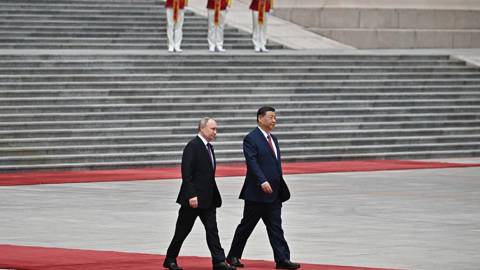As the war in Lebanon continues, the term “disproportionate force” is being bandied about as if some crystal clear principle of international law lay behind it, telling us when force is disproportionate and why it is illegal. But civilian deaths as a result of military combat are not enough to say that “disproportionate force” has been used. Nor has that standard, whatever it is, been met if more children die on one side than the other. So what, then, does “disproportionate force” mean, and what is its place in the law of war?
Let’s go back to basics. In the domestic law of self‑defense, the use of force must always be both necessary and proportionate to the interest being protected. A good example is whether a storeowner may shoot looters who are escaping with his goods. If there is no other way to stop the thieves, the use of force is necessary.
But is it proportional? That depends on whether the cost to the looters of being shot so clearly outweighs the value of the stolen goods that the storeowner should do nothing, at least at the moment. He always has recourse to the police and the possibility that they might recover the goods. In other words, force becomes disproportionate when the costs of using it are too high.
However, this does not mean that force becomes “disproportionate” simply when the costs outweigh the benefits. After all, a woman may use deadly force to avoid being raped, even though the life of the aggressor, one would think, is worth more than the sexual integrity of the potential victim.
Anytime physical harm is threatened, it seems that the use of all necessary force is permissible. Suppose a terrorist is pulling out his victim’s teeth one by one, and that the only way to stop him is to kill him. Most people would say that doing so is permissible, even though the harm to the aggressor is much greater than the value of the victim’s teeth.
How, then, do we know when force is disproportionate? This is a matter of constant debate. Many legal systems now take the position that, with regard to property offenses at least, the victim must be willing to surrender his property when the only available option is to kill the thief.
Let us try to apply these principles to international conflict. Two distinct realms of self‑defense exist within the law of war. One is the justification for going to war in the first place; the second is the use of force in combat in the course of war, such as killing civilians who are attacking soldiers.
In the justification of armed conflict, everyone agrees that the defending state may use all necessary force to repel an aggressor. When Argentina invaded and occupied the Falkland Islands, the United Kingdom could take whatever measures were necessary to remove them.
But let us suppose that the British bombed Buenos Aires. For the use of force to be necessary, it must yield a direct military advantage that contributes to thwarting the aggression. It would not be acceptable to argue that to bomb a city on the mainland was necessary in order to compel the Argentine population to put pressure on the military junta to withdraw from the islands. So bombing Buenos Aires in that context would have been unnecessary and therefore could not possibly qualify as proportionate.
International lawyers commonly confuse the concepts of necessity and proportionality, claiming that both apply in wars of self‑defense. But this is not as clear as it is in domestic criminal law. I know of no case in the international version of shooting escaping looters where a court has affirmed that the use of force was necessary but not proportionate.
There are two reasons why international law is tolerant of the use of all, or nearly all, necessary force. First, in international conflicts, the defending army must always protect the lives of its citizens, not just property interests. Second, with rare exceptions, there is no international police force that can assist a defending nation.
The problem of disproportionate force has different contours on the battlefield, when soldiers are already at war. Among all the dozens of war crimes in international law, none mentions the element of disproportionate force. The closest adjective used in the Rome Statute is “clearly excessive” force.
Intentional targeting of civilians is prohibited, as is an attack on military targets in the knowledge that there will be “clearly excessive” harm relative to the value of the military target. As one would expect, there is no criterion, not even a theory, for determining when the use of force carries an excessive cost to civilian bystanders.
The specific problem in Lebanon, particularly Israel’s bombing of southern Beirut, is deciding when the targets are protected civilians or part of a militant terrorist organization and thus subject to legitimate attack. We have too little information about many of these attacks to know one way or the other. This is an area where the concepts are clear but the facts remain murky. Journalists on the ground would do well to inquire about the relevant military objectives rather than pass judgment on the basis of the numbers of civilians killed, which may have minimal relevance to legal analysis.










As the war in Lebanon continues, the term “disproportionate force” is being bandied about as if some crystal clear principle of international law lay behind it, telling us when force is disproportionate and why it is illegal. But civilian deaths as a result of military combat are not enough to say that “disproportionate force” has been used. Nor has that standard, whatever it is, been met if more children die on one side than the other. So what, then, does “disproportionate force” mean, and what is its place in the law of war?
Let’s go back to basics. In the domestic law of self‑defense, the use of force must always be both necessary and proportionate to the interest being protected. A good example is whether a storeowner may shoot looters who are escaping with his goods. If there is no other way to stop the thieves, the use of force is necessary.
But is it proportional? That depends on whether the cost to the looters of being shot so clearly outweighs the value of the stolen goods that the storeowner should do nothing, at least at the moment. He always has recourse to the police and the possibility that they might recover the goods. In other words, force becomes disproportionate when the costs of using it are too high.
However, this does not mean that force becomes “disproportionate” simply when the costs outweigh the benefits. After all, a woman may use deadly force to avoid being raped, even though the life of the aggressor, one would think, is worth more than the sexual integrity of the potential victim.
Anytime physical harm is threatened, it seems that the use of all necessary force is permissible. Suppose a terrorist is pulling out his victim’s teeth one by one, and that the only way to stop him is to kill him. Most people would say that doing so is permissible, even though the harm to the aggressor is much greater than the value of the victim’s teeth.
How, then, do we know when force is disproportionate? This is a matter of constant debate. Many legal systems now take the position that, with regard to property offenses at least, the victim must be willing to surrender his property when the only available option is to kill the thief.
SPRING SALE: Save 40% on all new Digital or Digital Plus subscriptions
Subscribe now to gain greater access to Project Syndicate – including every commentary and our entire On Point suite of subscriber-exclusive content – starting at just $49.99.
Subscribe Now
Let us try to apply these principles to international conflict. Two distinct realms of self‑defense exist within the law of war. One is the justification for going to war in the first place; the second is the use of force in combat in the course of war, such as killing civilians who are attacking soldiers.
In the justification of armed conflict, everyone agrees that the defending state may use all necessary force to repel an aggressor. When Argentina invaded and occupied the Falkland Islands, the United Kingdom could take whatever measures were necessary to remove them.
But let us suppose that the British bombed Buenos Aires. For the use of force to be necessary, it must yield a direct military advantage that contributes to thwarting the aggression. It would not be acceptable to argue that to bomb a city on the mainland was necessary in order to compel the Argentine population to put pressure on the military junta to withdraw from the islands. So bombing Buenos Aires in that context would have been unnecessary and therefore could not possibly qualify as proportionate.
International lawyers commonly confuse the concepts of necessity and proportionality, claiming that both apply in wars of self‑defense. But this is not as clear as it is in domestic criminal law. I know of no case in the international version of shooting escaping looters where a court has affirmed that the use of force was necessary but not proportionate.
There are two reasons why international law is tolerant of the use of all, or nearly all, necessary force. First, in international conflicts, the defending army must always protect the lives of its citizens, not just property interests. Second, with rare exceptions, there is no international police force that can assist a defending nation.
The problem of disproportionate force has different contours on the battlefield, when soldiers are already at war. Among all the dozens of war crimes in international law, none mentions the element of disproportionate force. The closest adjective used in the Rome Statute is “clearly excessive” force.
Intentional targeting of civilians is prohibited, as is an attack on military targets in the knowledge that there will be “clearly excessive” harm relative to the value of the military target. As one would expect, there is no criterion, not even a theory, for determining when the use of force carries an excessive cost to civilian bystanders.
The specific problem in Lebanon, particularly Israel’s bombing of southern Beirut, is deciding when the targets are protected civilians or part of a militant terrorist organization and thus subject to legitimate attack. We have too little information about many of these attacks to know one way or the other. This is an area where the concepts are clear but the facts remain murky. Journalists on the ground would do well to inquire about the relevant military objectives rather than pass judgment on the basis of the numbers of civilians killed, which may have minimal relevance to legal analysis.